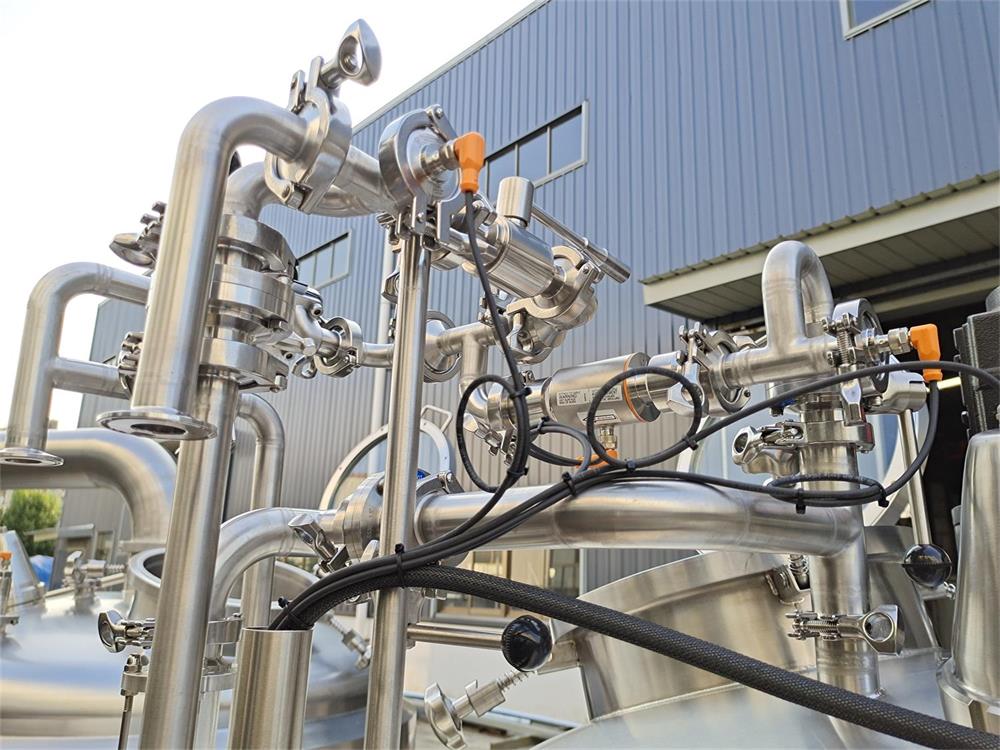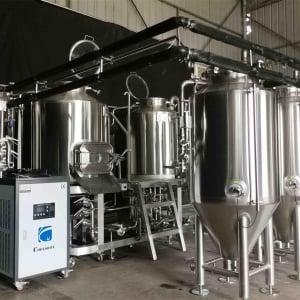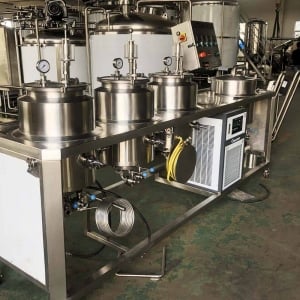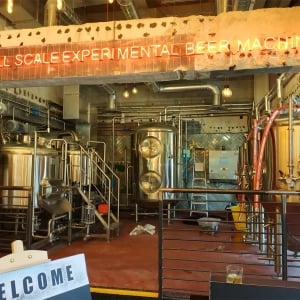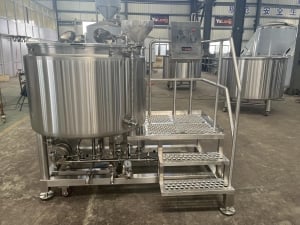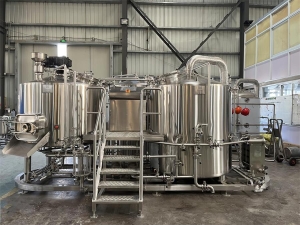Table of Contents
ToggleWhat is Professional Beer Brewing Equipment?
Beer brewing has been practiced for millennia, but as the craft has evolved, so too has the machinery. Professional beer brewing equipment refers to the advanced machinery and tools used in the production of beer on a large scale. Unlike the small kits you might buy for home brewing, these professional setups are designed to optimize the brewing process for efficiency, consistency, and scale.
Historically, beer was brewed in small batches using basic tools. However, as the demand for beer grew and technology advanced, the need for more efficient equipment became evident. Today’s professional beer brewing equipment has been crafted with precision engineering and is often made of stainless steel to ensure longevity and cleanliness.
There are numerous components in a professional setup. A typical setup might include:
- Mashing Tanks: Where grains are soaked and converted into sugar.
- Fermentation Vats: Where the yeast transforms sugar into alcohol.
- Cooling Systems: These help regulate the temperature during fermentation.
- Filtering Systems: They ensure clarity and purity in the final product.
- Storage Tanks: For holding beer before it’s bottled or kegged.
The choice of equipment can vary based on the scale of production, the specific beer being produced, and the preferences of the brewer. With the rise of craft beer and microbreweries, there has been a surge in the diversity of equipment available, catering to different brewing philosophies and techniques.
In conclusion, professional beer brewing equipment is a testament to the growth and evolution of the beer industry. As brewers strive for perfection, these tools will continue to play an indispensable role in bringing quality beer to the masses.

How Much Does Professional Beer Brewing Equipment Cost?
The cost of professional beer brewing equipment can vary dramatically based on several factors, including the scale of production, the quality of the equipment, and the manufacturer. Whether you’re starting a microbrewery or scaling up a brewing business, understanding the costs involved is crucial.
For those who are new to the industry, the price ranges can be quite surprising. Here’s a breakdown of the approximate cost for some of the most common pieces of professional beer brewing equipment:
| Equipment | Price Range (USD) | Typical Brand Names |
|---|---|---|
| Mashing Tanks | $5,000 – $50,000 | Blichmann, Stout Tanks |
| Fermentation Vats | $10,000 – $200,000 | Ss Brewtech, Alpha |
| Cooling Systems | $3,000 – $25,000 | G&D, Pro Refrigeration |
| Filtering Systems | $2,000 – $20,000 | Pall, Eaton |
| Storage Tanks | $5,000 – $100,000 | GW Kent, Glacier Tanks |
While these figures provide a general overview, there are many other costs to consider. For instance, installation fees, shipping costs, and maintenance can add significantly to the initial investment. It’s also worth noting that customized solutions or specialized equipment might command higher prices.
Branding also plays a pivotal role in determining the price. Established manufacturers with a reputation for quality and reliability often charge a premium. However, this often comes with benefits like better customer support, longer warranties, and more efficient performance.
Another consideration is the country of manufacture. While European and American equipment often come with a higher price tag due to their established reputation for quality, Asian equipment, particularly from China, offers competitive prices. This has led to an influx of Chinese equipment in the market, with many brewers opting for them due to their cost-effectiveness.
However, it’s essential to be cautious when purchasing solely based on price. Lower-priced equipment might lead to higher long-term costs if frequent repairs or replacements are required. It’s advisable to conduct thorough research, check reviews, and maybe even visit the manufacturing facility if possible.
Finally, financing options and potential tax breaks or grants for small businesses can also play a role in determining the net cost to the brewer. Many suppliers and financial institutions offer financing solutions tailored for breweries.
What are the Types of Professional Beer Brewing Equipment?
Professional beer brewing is a complex process that requires a series of specialized equipment, each designed for a specific stage of brewing. Understanding these types can aid prospective brewers in making informed decisions when setting up or upgrading their facilities. Here’s an overview of the primary types of professional beer brewing equipment and their price ranges:
- Mashing Equipment:
- Mash Tun: This is where the milled grain is mixed with hot water to activate enzymes, converting starches into fermentable sugars.
- Lauter Tun: Used to separate the liquid wort from the grain husks.
- Price Range: $5,000 – $60,000
- Boiling & Whirlpool Equipment:
- Brew Kettle: This is where the wort is boiled with hops, which contributes bitterness and aroma to the beer.
- Whirlpool: Helps in separating the hops and other solid residues from the boiled wort.
- Price Range: $10,000 – $150,000
- Fermentation Equipment:
- Fermenters: Vessels where yeast is added to the cooled wort, initiating the fermentation process.
- Bright Beer Tanks: Used to mature, clarify, and carbonate the beer after primary fermentation.
- Price Range: $7,000 – $250,000
- Cooling & Temperature Control:
- Heat Exchangers: Devices that cool down the hot wort rapidly after boiling.
- Glycol Systems: Essential for maintaining the desired temperature during fermentation.
- Price Range: $2,000 – $30,000
- Packaging Equipment:
- Bottling Lines: Automated systems for filling, capping, and labeling bottles.
- Kegging Systems: For filling and sealing kegs, crucial for draft beer distribution.
- Price Range: $20,000 – $500,000
The exact cost of each type can vary significantly based on factors like capacity, features, and the manufacturer’s reputation. Investing wisely in these tools can not only streamline the brewing process but also enhance the quality and consistency of the final beer.
What are the Functions of Professional Beer Brewing Equipment?
Crafting a perfect pint of beer is as much an art as it is a science. Each piece of professional beer brewing equipment plays a pivotal role in ensuring the beer’s taste, aroma, appearance, and mouthfeel. Let’s delve deeper into the functions of these key equipment:
- Mashing Equipment: The primary goal during mashing is to convert the starches in malted grains into fermentable sugars. This process requires maintaining specific temperatures to activate enzymes. The equipment ensures that these conditions are met and maintained.
- Boiling & Whirlpool Equipment: Boiling the wort serves multiple purposes – it sterilizes the wort, extracts flavors and bitterness from the hops, and evaporates unwanted volatile compounds. Post boiling, the whirlpool function helps in separating hop residues and other solids from the wort.
- Fermentation Equipment: This is where the magic happens. Yeast is introduced into the cooled wort, converting sugars into alcohol and carbon dioxide. The fermenters maintain a controlled environment, allowing yeast to function optimally. They also provide a sealed environment, preventing contamination from outside microbes.
- Cooling & Temperature Control: Rapidly cooling the wort after boiling is essential to prevent unwanted bacterial growth. Moreover, fermentation is a temperature-sensitive process; too warm or too cold can severely affect the beer’s flavor profile. Cooling systems ensure that temperatures are consistent throughout.
- Packaging Equipment: Once the beer has been fermented and matured, it’s ready for distribution. Packaging equipment ensures that beer is transferred into bottles or kegs without introducing oxygen, which can stale the beer. Automated systems also ensure consistent volume, carbonation levels, and efficient labeling for mass distribution.
In essence, every piece of equipment in the brewing process is meticulously designed to tackle specific challenges, ensuring that the beer’s quality is uncompromised from grain to glass.
In Which Applications is Professional Beer Brewing Equipment Commonly Used?
The craft beer revolution has seen an exponential growth in breweries worldwide, each with its unique flavor profiles, brewing techniques, and target markets. As a result, the applications of professional beer brewing equipment have expanded to cater to varied brewing needs. Here’s a comprehensive look:
- Microbreweries: These are small-scale breweries, typically producing less than 15,000 beer barrels annually. They prioritize quality, flavor, and brewing technique over large-scale distribution. Professional brewing equipment tailored for microbreweries tends to focus on flexibility, allowing brewers to experiment with different beer styles.
- Brewpubs: A blend of a brewery and a pub, brewpubs brew their beer on the premises and serve it alongside food. The equipment in these settings is often visible to customers, emphasizing the freshness of the brew. The scale of the equipment is usually smaller than that of larger breweries but is designed for more frequent brewing cycles due to the direct-to-consumer model.
- Regional Breweries: These breweries serve a larger area, often a whole country or multiple states. Their equipment is larger in scale, focusing on consistency and efficiency. With an annual production ranging from 15,000 to 6 million barrels, the brewing setups need to handle significant demand.
- Large Breweries: These are the giants of the beer world, producing more than 6 million barrels annually. Their equipment is industrial-scale, with enormous fermentation tanks, sophisticated automation, and advanced quality control systems.
- Contract Brewing Companies: Some companies don’t have their own brewing facilities. Instead, they hire another brewery to produce their beer. In such scenarios, the brewing equipment must be versatile to adapt to various recipes and brewing techniques of different brands.
- Nano Breweries: Even smaller than microbreweries, nano breweries often start as hobby projects and grow into commercial endeavors. They might produce as little as one barrel in a batch. The equipment used here is a step above home-brewing kits but retains the spirit of grassroots brewing.
- Specialty and Experimental Breweries: These establishments focus on creating unique, often limited-edition brews. Think of beers with unconventional ingredients like fruits, spices, or even coffee. The brewing equipment in such setups often includes additional vessels or machinery to handle these ingredients.
- Educational Institutions: With the growth of the craft beer industry, many universities now offer brewing science programs. These institutions utilize professional brewing equipment for hands-on training, allowing students to learn the intricacies of brewing on industry-standard equipment.
The diverse applications of beer brewing equipment underscore the versatility and adaptability of these tools. Whether it’s a small-scale experimental brew or mass production for a global market, the right equipment plays an integral role in bringing the brewmaster’s vision to life.
How Does Professional Beer Brewing Equipment Benefit You?
For those passionate about beer, transitioning from a hobbyist to a professional brewer is a dream come true. The difference between homebrew setups and professional-grade equipment isn’t just in size but in the benefits they offer. Let’s explore how professional beer brewing equipment can elevate your brewing game:
- Consistency: One of the hallmarks of a great beer is consistency. Whether it’s the first batch or the hundredth, customers expect the same flavor profile every time they open a bottle. Professional equipment, with its precision controls and measurements, ensures that each brewing process is consistent with the last, resulting in a uniform product batch after batch.
- Scalability: As your brewery grows and demand increases, you’ll need equipment that can handle larger batches without compromising quality. Professional beer brewing equipment is designed with scalability in mind, allowing brewers to increase their output without reinvesting in an entirely new system.
- Efficiency: Time is of the essence in the brewing world. The faster you can move from one batch to the next, the better. Professional setups are optimized for quicker mashing, boiling, fermenting, and even cleaning processes. This efficiency not only saves time but reduces resource consumption, which can have significant cost implications.
- Quality Control: Beyond consistency, ensuring that each batch is free from contaminants and off-flavors is paramount. High-grade equipment often comes with built-in quality control mechanisms, such as sterilization systems and closed environments, which keep unwanted microbes at bay.
- Versatility: The world of beer is vast and varied. From stouts to IPAs, each beer type has its unique brewing requirements. Professional equipment often offers versatility, allowing brewers to switch between different brewing styles with ease.
- Longevity and Durability: Crafted from high-grade materials like stainless steel, professional equipment is built to last. These machines can withstand the rigors of daily brewing for years, if not decades. This durability ensures that brewers get a high return on their investment.
- Safety: Brewing, with its boiling worts and pressurized vessels, comes with inherent risks. Professional-grade equipment is designed with safety in mind, featuring pressure relief valves, sturdy constructions, and safety interlocks to protect both the brew and the brewer.
How to Choose the Right Professional Beer Brewing Equipment?
Stepping into the realm of professional brewing is an exciting journey, but it’s also fraught with challenges. One of the most significant decisions you’ll make is selecting the right brewing equipment. With myriad options available, how do you ensure you’re making the right choice? Here’s a guide to help you navigate this essential decision:
- Assess Your Needs: Before diving into product catalogs, take a step back and evaluate your needs. Are you setting up a microbrewery, a brewpub, or a regional brewery? The scale of your operation will significantly influence the kind of equipment you need. Draft a business plan, estimate your production requirements, and decide on the range of beers you wish to produce.
- Budget Constraints: Professional brewing equipment can be expensive. It’s crucial to set a clear budget to guide your choices. However, remember that the cheapest option isn’t always the best. Investing in quality equipment can save you costs in repairs and inefficiencies in the long run.
- Quality over Quantity: Always prioritize the quality of the equipment over the sheer number of features it offers. Reliable, durable, and efficient machinery will be more beneficial than an overly complicated system with features you may never use.
- Manufacturer Reputation: Dive into the brewing community and seek recommendations. Which brands or manufacturers are renowned for their reliability and customer service? Consider looking at reviews, testimonials, and even reaching out to other brewers for their insights.
- Flexibility and Upgradability: The brewing industry is continually evolving, with new techniques and styles emerging regularly. Ensure that the equipment you choose has the flexibility to adapt to these changes. Some equipment also offers upgradability options, allowing you to enhance their capabilities without replacing them entirely.
- Maintenance and Support: Brewing equipment will require regular maintenance to operate at peak efficiency. Before purchasing, investigate what kind of maintenance is needed and how often. Does the manufacturer offer support? Are replacement parts easily available? Ensure you have a clear understanding of these aspects.
Given the extensive nature of this decision, thorough research and consideration are vital. Choosing the right equipment will not only shape your brewing processes but also the quality of beer that you produce.
Who are the Top 10 Professional Beer Brewing Equipment Manufacturers?
In the burgeoning world of craft beer, the choice of brewing equipment can significantly impact the quality of the final product. With numerous manufacturers vying for attention, selecting the best can be a daunting task. Here’s a roundup of the top 10 revered beer brewing equipment manufacturers known for their quality and reliability:
- Blichmann Engineering:
- Country: USA
- Speciality: Known for their innovative homebrewing equipment, they’ve ventured into pro-level gear that retains the essence of craft brewing.
- Ss Brewtech:
- Country: USA
- Speciality: Combining aesthetics with functionality, they offer a range of stainless steel brewing equipment from fermenters to brewhouses.
- Krones AG:
- Country: Germany
- Speciality: A giant in the beverage production equipment industry, their brewing solutions are top-notch and are used worldwide.
- GEA Group:
- Country: Germany
- Speciality: With a holistic approach to brewing, GEA offers solutions from raw material handling to packaging.
- BrauKon:
- Country: Germany
- Speciality: Catering to both small craft brewers and industrial giants, their equipment is known for efficiency and precision.
- Pall Corporation:
- Country: USA
- Speciality: While not strictly a brewing equipment manufacturer, their filtration systems are a staple in many breweries.
- DME Process Systems Ltd:
- Country: Canada
- Speciality: With decades of experience, DME provides bespoke brewing solutions tailored to individual brewery needs.
- Alpha Brewing Operations:
- Country: USA
- Speciality: From nano-breweries to large-scale operations, Alpha offers a wide range of equipment solutions with a focus on innovation.
- PKW (Portland Kettle Works):
- Country: USA
- Speciality: With a strong focus on craft breweries, their equipment is designed to bring out the best in every brew.
- JV Northwest:
- Country: USA
- Speciality: A stalwart in the brewing equipment scene, JV Northwest offers tanks and systems built for longevity and reliability.
Selecting equipment from these manufacturers can offer peace of mind, knowing you’re investing in machinery that has stood the test of time and is endorsed by brewers worldwide. Whether you’re setting up a new brewery or looking to upgrade, these manufacturers offer a blend of innovation, quality, and brewing heritage.
Where to Buy Professional Beer Brewing Equipment?
When setting out to buy professional beer brewing equipment, many considerations come into play, from scale and budget to specific brewing needs. With the rise in craft brewing, several suppliers offer varying levels of equipment sophistication and customization. Here’s a comprehensive guide on where to source your professional brewing equipment:
- Local Dealers and Distributors:
- Often, local dealers have partnerships with renowned manufacturers, facilitating quicker shipping and localized support. Purchasing through them can also mean better after-sales service, faster response times for maintenance or repair, and potential discounts.
- Directly from Manufacturers:
- Buying directly from manufacturers may be more cost-effective as it cuts out the middleman. This option also allows for more customization and a direct line of communication with those producing your equipment.
- Online Retailers and Marketplaces:
- Platforms like Alibaba, AliExpress, and even some specialized brewing forums or websites offer equipment for sale. Ensure to verify the authenticity of sellers, read reviews, and understand the terms of sale when buying online.
- Brewing Expositions and Trade Shows:
- These events often showcase the latest technologies and innovations in brewing equipment. They offer a chance to see equipment up close, meet manufacturers, and even negotiate deals.
- Used Equipment Dealers:
- For those on a tight budget, purchasing second-hand equipment can be a viable option. Ensure that any used equipment is thoroughly inspected for wear, damage, or any potential issues that might affect its performance.
- Industry Associations and Networks:
- Joining professional brewing associations can provide leads on where to purchase equipment. Fellow members often share recommendations, reviews, and sometimes even have equipment for sale or know of good deals.
Remember, while the source is important, ensuring the equipment fits your specific brewing needs and comes with necessary certifications and guarantees is paramount.
The Product Advantages of Chinese Beer Brewing Equipment
China has rapidly emerged as a significant player in the manufacturing of beer brewing equipment. Thanks to advancements in technology and stringent quality control measures, Chinese suppliers have earned a reputation for producing equipment that rivals, if not surpasses, that of more established Western brands. Here’s a look into the advantages of opting for Chinese beer brewing equipment:
- Cost-Effective:
- One of the most compelling reasons brewers turn to Chinese manufacturers is the cost advantage. Despite maintaining high-quality standards, production costs in China remain relatively low, translating to competitive prices for buyers.
- Customization:
- Chinese manufacturers, like YoLong Brewtech, often offer bespoke solutions tailored to specific brewery needs. From custom sizes to integrating unique features, they can often meet and exceed customization requirements.
- Technological Advancements:
- Chinese equipment manufacturers are continually investing in research and development, ensuring that they are at the forefront of brewing technology.
- Quality Assurance:
- Contrary to outdated perceptions, many Chinese manufacturers adhere to stringent quality control measures. Companies like YoLong Brewtech, with their state-of-the-art manufacturing plant, ensure every custom-designed project matches the customer’s exact specifications.
- Wide Range of Options:
- From nano-brewery setups to large-scale industrial systems, Chinese manufacturers offer a wide range of equipment options catering to different scales and styles of brewing.
- Global Shipping and Installation:
- Most reputable Chinese manufacturers provide global shipping options. Additionally, many offer installation services, ensuring that the equipment is set up correctly and optimally.
- Integrated Solutions:
- Beyond just brewing equipment, manufacturers like YoLong Brewtech provide integrated solutions, catering to a wide range of beverages, including beer, kombucha, cold-brewed coffee, and infused teas.
- Dedicated Support:
- Post-sale support is crucial, especially with equipment as complex as brewing systems. Many Chinese manufacturers offer dedicated support, ensuring smooth operations post-purchase.
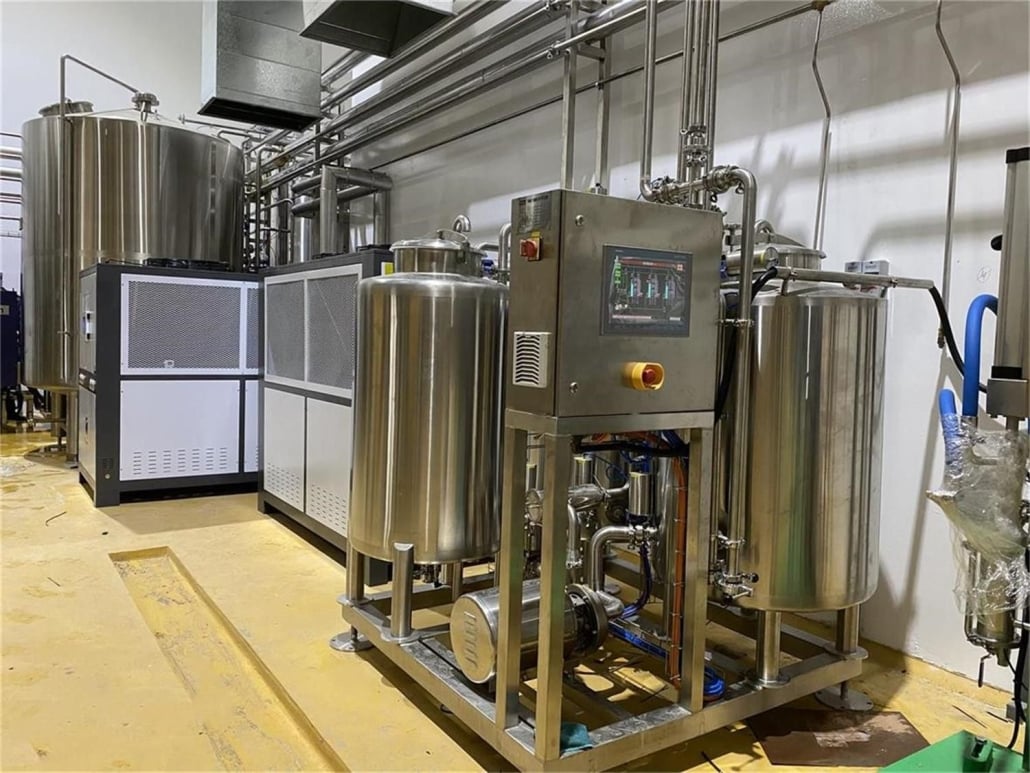
Identifying the Best Chinese Beer Brewing Equipment Supplier
When it comes to sourcing professional beer brewing equipment, finding the right supplier is just as critical as the equipment itself. With numerous manufacturers in China, identifying the best can be a challenge. Here are key aspects to consider when evaluating Chinese beer brewing equipment suppliers:
- Company Profile & Experience:
- Consider suppliers with a proven track record in the industry. For instance, YoLong Brewtech, founded in 2004, has over 15 years of experience in brewery equipment manufacturing. Their dedication has positioned them as industry leaders, delivering custom-designed and pre-made brewing equipment of exceptional quality.
- Range of Products:
- An extensive product range indicates the supplier’s capability to cater to various brewing needs. YoLong Brewtech, for instance, manufactures products not only for beer but also cold-brewed coffee, kombucha, infused teas, and wine.
- Manufacturing Facilities:
- A state-of-the-art manufacturing facility is a testament to the company’s commitment to quality. YoLong Brewtech’s 36,000 m2 manufacturing plant in the Ningbo City Economic Development Zone ensures that every project is fabricated to the customer’s exact specifications.
- Customer Reviews and Recommendations:
- Past customer reviews and testimonials can provide insights into the supplier’s reliability, quality of products, and post-sale service.
- Support & After-Sales Service:
- Ensure that the supplier provides robust post-purchase support, from installation guidance to maintenance and repairs.
When sourcing equipment, especially from overseas, due diligence is essential. Taking the time to research and verify suppliers can ensure a smooth brewing journey ahead.
FAQ
Q1: Is Chinese-manufactured brewing equipment comparable in quality to Western brands?
While quality can vary among manufacturers, top Chinese suppliers like YoLong Brewtech have established a reputation for producing equipment of a standard that rivals, if not surpasses, many established Western brands. Always research and verify the specific manufacturer’s reputation before purchasing.
Q2: What maintenance is required for professional beer brewing equipment?
Routine maintenance involves regular cleaning after every batch, inspecting valves and seals for wear and tear, and periodically checking electrical and electronic components. Detailed maintenance routines will often be provided by the equipment manufacturer.
Q3: How often should I upgrade my brewing equipment?
The frequency of upgrades depends on the wear and tear of your equipment, technological advancements, and your brewing needs. It’s not always necessary to upgrade unless there’s a significant technological advancement or if your current equipment no longer meets your brewing demands.
Q4: Can I get custom-sized brewing equipment to fit my brewery’s space constraints?
Yes, many manufacturers, especially companies like YoLong Brewtech, offer custom solutions tailored to specific spatial requirements and brewing needs. Always provide precise measurements and specifications when requesting custom solutions.
Q5: Is it possible to scale up my brewing equipment as my production grows?
Absolutely. Modular brewing systems allow for scalability. It’s advisable to discuss potential future growth with your supplier to ensure the initial setup can be easily expanded upon.
Q6: What’s the average lifespan of professional beer brewing equipment?
With proper maintenance and care, brewing equipment can last for decades. The exact lifespan might vary based on usage, but a well-maintained system can serve reliably for 10-20 years or even longer.
Q7: How do I ensure the safety of my brewing operations?
Safety is paramount. Always follow the manufacturer’s guidelines, ensure regular maintenance checks, train your staff adequately, and consider installing safety equipment like fire suppressants and gas leak detectors. Remember, it’s always better to be proactive in ensuring safety.

